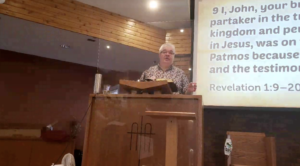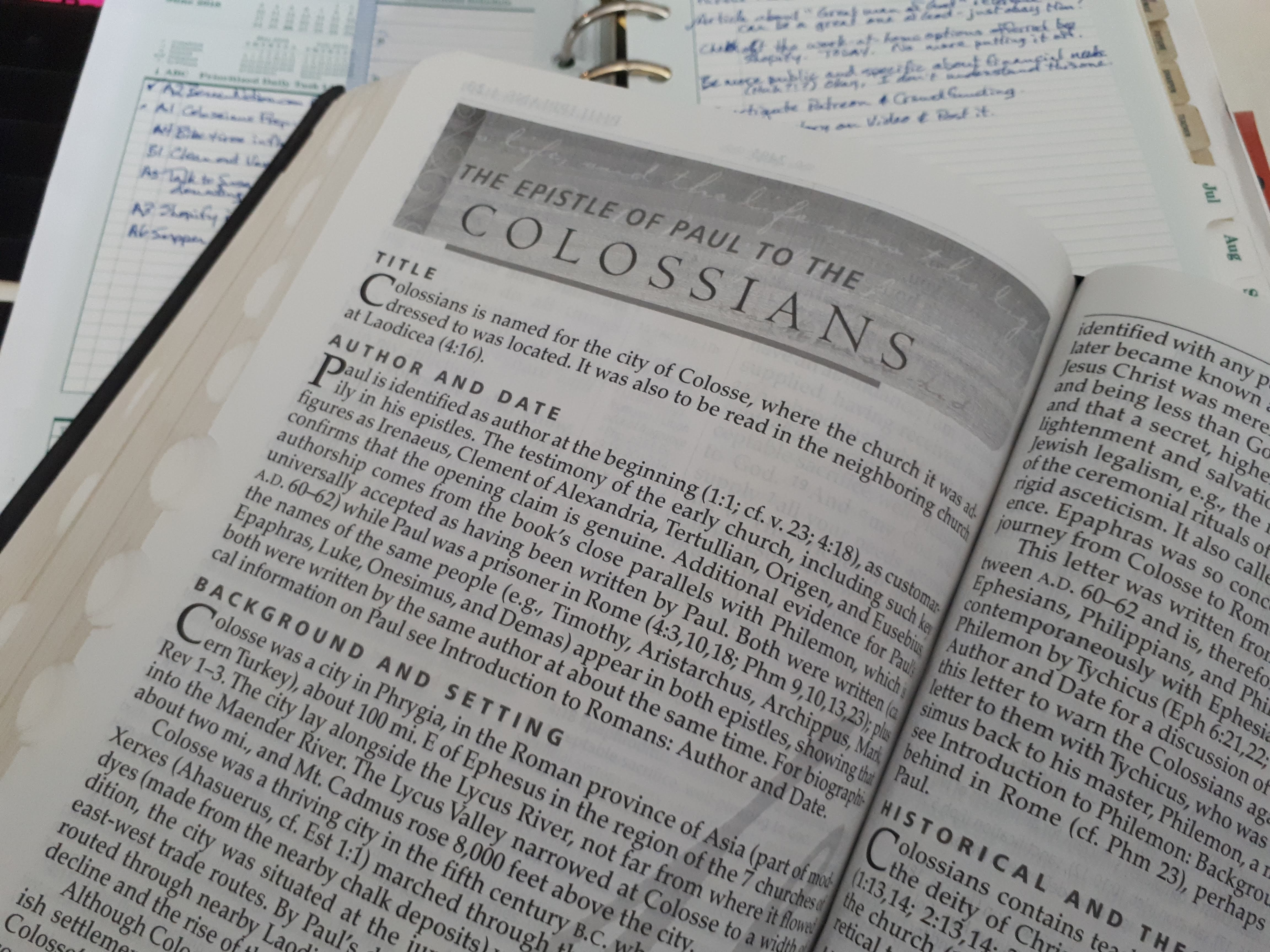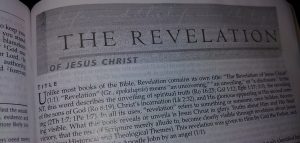Revelation 2:1-7 – The Letter to Ephesus
As we begin, I want to expand on something I said in the introduction to this section of the study. In our reading of scripture, the Holy Spirit leads us to understand that there is often more than one level of focus than just the words of the text. In every one of the letters, we will see that there is a local message to the named church that deals with the need that church had at that time. However, there are things beyond that. Notice what it says in 2:7, 11, 17, 29, 3:6, 13, and 22: “He who has an ear, let him hear what the Spirit says to the churches.” The word “churches” is plural! This means that there is something for all the churches in each of the letters. Also, notice the phrase “He who has an ear, let him hear…” There is a homiletic application to anyone who reads the letter. Finally, the letters are arranged in such a way as to give a prophetic type of the historical Church, the body of Christ during all the ages it has been on earth. If the letters were arranged in any other way, this would not be true, and it has some implications we should learn, understand, and act on.
Remember from our introduction that each letter has seven categories of interest. I suggest using a spreadsheet to keep track of them. I turned mine into a PDF and put it here as an example:
https://docs.google.com/file/d/0B9nwpXe7coTAQ1NJNm5hTkRkZW8/edit?usp=sharing
Let us review them here.
- The meaning of the name of the church
- Christ’s chosen title of greeting
- Christ’s commendation of the church (if any)
- Christ’s concern or caution for the church (if any)
- Christ’s exhortation or encouragement for the church
- Christ’s promise to the overcomer
- The location of the closing of the letter
These observations have some importance in a mastery of these seven letters, and it is important that we as followers of Jesus do so. In fact, these seven letters may be the only part of the book that directly applies to us, depending on what you think of the harpazo, or the “rapture” (from Latin). I personally go back and forth on that issue between pre- and mid-tribulation points of view, because both make relevant arguments. These days, I am leaning more towards pre-tribulation rapture, but that is a side issue in this letter at least.
We should also remind ourselves that there is more than one level of what the Bible says on any specific issue, and I will try to shed some light in all of these areas as I can and as the finding of resources allow. I am aware of at least these four levels of address and I will review them here:
- Local and historical relevance to the church that is addressed
- Relevance to all the churches (the letters were all written to ALL the churches)
- Homiletic relevance to all believers (let the one who has an ear hear)
- Prophetic relevance through history (and it only works if the churches are in this specific order)
With that in mind, let us begin our consideration of the letter to Ephesus. I’ll begin with a brief history of the city.
The city of Ephesus was an ancient Greek city that was located near the modern city of Selçuk in the Turkish province of Izmir. The area was already inhabited as early as the Neolithic age (circa 6000 BC), but recent archaeological digs place the first evidence of an actual city there around 1500-1400 BC (Bronze Age) likely built by the Mycenaeans, an ancient Greek tribe. In 650 BC, it was attacked by the Cimmerians, after which it was ruled by a series of tyrants, until about 560 BC, when it fell under Lydian control under king Croesus, when the city began to prosper. Croesus was later defeated by the Persians led by Cyrus the Great (mentioned in the book of Daniel) under whom the city continued to prosper. High taxes under succeeding rulers (including Darius from the book of Daniel) led to the Ionian revolt and the Greco-Persian wars. The rule of Ephesus was contested until the cities were finally liberated in 334 BC by Alexander the Great. When Alexander died in 323 BC, the city was included in the territory that was ceded to his General Lysimachus.
Ephesus had another problem, present through all this time – the natural harbours on the banks of the Cayster river kept silting up, necessitating that the city be moved to new locations either periodically or in one long development. During the rule of Lysimachus, he ended up flooding the old city by blocking the sewers, which required the citizens to move to a new city about 2 kilometres away. Lysimachus named this city Arsinoea after his wife, Arsinoea II of Egypt. At some point, Ephesus revolted and gave their allegiance to King Seleucus I of Syria and Mesopotamia, and after the death of Lysimachus, retook the name Ephesus in about 281 BC.
Eventually, the Seleucid monarchy died off, and left the city open to the Roman republic, wehre it was nearly taxed and slaughtered out of existence under a series of tyrannical despots until Augustus became Caesar in 27 BC. Augustus moved the capital of proconsular Asia from Pergamum to Ephesus and the city began to be prosperous once again. At that time, it is estimated that the population of the city was about 250,000.
Ephesus was also known for the Temple of Artemis (Roman, Diana). We read of this even in the book of Acts, where artisans that made their living on making images of Artemis felt threatened by the large-scale conversion to Christianity, and began a riot that culminated in an angry mob chanting “Great is Diana of the Ephesians” for several hours.
This is the Ephesus to whom John scribes his letter for Jesus. The name “Ephesus” literally means “Desired One,” or if you like, “Darling.” Given that all the letters apply in some respect to all the churches and even to all believers in the Church, the body of Christ, I think this address is from the Heavenly Groom to His Heavenly Bride in some measure.
The Lord begins His address to the Ephesian church as “the One who holds the seven stars in His right hand, the One who walks among the seven golden lampstands.” These are identified in the last verse of Revelation 1 (v20) – “As for the mystery of the seven stars which you saw in My right hand, and the seven golden lampstands: the seven stars are the angels of the seven churches, and the seven lampstands are the seven churches.” Basically, the Lord Jesus is identifying Himself here as “the One in Charge.” Ephesus, as we have discovered struggled over her history with jurisdictional issues. Several times, control of the city was actually disputed, and this caused problems like the flooding of the city under Lysimachus or the high taxes under Darius resulting in a revolt. Jesus here wants to leave no doubt – He is the one who is really in charge.
He praises the church at Ephesus as a whole for doing a great job of not only adhering to the truth of the Scriptures, but of rooting out those who would teach falsehoods and getting rid of them. They did so consistently and repeatedly without getting complacent or lazy about it. If the doctrine was sound, it was to found in the church at Ephesus. But then comes a surprising criticism – they have left their first love. This is saying a great deal, but foremost of all, I believe this is telling us all that good doctrine is not enough in the pursuit of Jesus. Christianity, for all of the world’s classification of us, should not ever be a religion, or a systematic school of thought used in determining right and wrong thoughts, words, or behaviours. It needs to be a relationship. This letter was written to the “desired one,” or to “darling.” It was written to the heavenly Bride from her heavenly Groom, and this isn’t the only place that a marriage analogy is given to describe the relationship between Christ and the Church. Certainly, we need to find the truth – it is what sets us free – but we must also love the Lord! This is what should motivate all our actions, not an impersonal checklist. And we must daily cultivate that love!
Let me point you to a resource I have written that deals with the need for this. I wrote a 35-page eBook called Practical Discipleship, and it is on sale for $2.99 on Amazon (profits are for cost recovery for the time that was put into it). You can find it here. (Hard link: http://www.amazon.ca/Practical-Discipleship-ebook/dp/B00CLVL58C/ref=sr_1_1?s=digital-text&ie=UTF8&qid=1367940788&sr=1-1&keywords=Practical+Discipleship) It talks about HOW and why to cultivate that relationship with Jesus every day.
I’ll get off my discipleship soapbox shortly and move on. Suffice it to say that we all need to love Jesus. I want to point out that they did not LOSE their first love. They LEFT it. The Greek word is ἀφίημι, or “aphiemi,” the word for “leave alone” or “neglect.” Christ’s exhortation to them to deal with the problem? Repent. That word “repent” (Gk. μετανοέω or metanoeo) means to change your mind or thinking about something. He even prescribes a method for this – remember! Then do the first things you did. There is more in the book I previously mentioned, but I’ll refer to a key verse for this – Acts 2:42. This records the very first things that the very first group of believers did, starting onb the very first day that the Gospel was preached and about 3000 people became Christians. It says that “they continually devoted themselves to the Apostles’ teachings, Fellowship, the breaking of bread (or Worship) and to Prayer.” Then Jesus gives a terrible promise, and I confess I don’t understand everything this might mean, and I also confess I don’t want to find out. He says that if you WILL NOT remember, repent, and obey, then He will come and remove the lampstand out of its place. He will at the very least, remove His testimony from your midst. I don’t know what other implications that may have, but that’s bad enough. Enough said about the need to cultivate your walk with Christ.
Jesus then deals with a second issue after that, but in a good way. Apparently there were a group called the Nicolaitans that the Lord hated that the Ephesian church also hated. Who were the Nicolaitans and what did they believe that was so reprehensible? As you may expect, it isn’t immediately clear, but I have heard two schools of thought on this. The first of these is that these were followers of one of the original 7 deacons named Nicolas. His heretical teaching was that it was acceptable to live lives of unrestrained hedonism. It was okay to eat food sacrificed to idols, it was okay to commit adultery, and it was okay to party like it was AD 99 (sorry, couldn’t resist that). If this is so, Epicurus would have been proud. This is seen as a seduction of the liberty that believers have because we are saved by Grace through Faith in Christ. After all, Jesus paid it all, right? The second school of thought comes from the grammatical construction of the word “Nicolaitans.” The word comes from two Greek roots: Nicos, to conquer, and Laos, the people. Nicolaitans becomes “to conquer the people.” Early scholars felt this was the setting up of an ecclesiastical structure of rules and a false priesthood to administer them as a governor over the simple faith that Jesus gave, instituting “sacrements” of observance and rules for conduct. You can decide for yourself what this means, but I see no reason that they couldn’t both be applicable in some measure. Here in Ephesus, they hated this. In Pergamum, they practiced this, whatever it was.
After these things, the Lord says this: “He who has an ear, let him hear what the Spirit says to the churches.” This line by itself tells us that this letter was not just for the believers in Ephesus, but the letter was for the other six churches (notice “churches,” plural), and to all believers that read the text (The one that has an ear, HEAR!). This is important because there are issues in ALL churches that all of these letters address, and there are issues in all BELIEVERS that these letters address, at least in some measure. This is why it is essential that we as Christians master the contents of these seven letters. The ALL apply to us. And depending on your views of eschatology and the harpazo (rapture, from the Latin rapio, the equivalent to the Greek harpazo), these may be the ONLY parts of Revelation that apply to us, right up until chapter 19 when the Lord returns. I’ll touch on that more in a future study in this book.
Then, almost as a postscript to the letter, the Lord gives his promise to those that overcome the challenges presented to the Ephesian church: “To him who overcomes, I will grant to eat of the tree of life which is in the Paradise of God.” If we can manage to overcome leaving our first love and cultivate our relationship with our heavenly husband Jesus, and if we can overcome the deeds of the Nicolaitans by keeping ourselves pure and humble, we get to eat some very special fruit – stuff that our forefathers were prevented from eating in the garden in Genesis 3 – fruit from the tree of Life itself.
As we have gone along, I have tried to point out some specific relevance to the local historical church, to the rest of the churches in general, and all believers in the body of Christ, but what of the prophetic relevance to the history of the church? (Later on, I’ll be able to diagram it a bit, but I have yet to make the diagram. I’ll try to start that for the next study.) This is a profile for the time in the history of the church we could call the Apostolic Church. There was a lot of searching out the truth, and standing against errors that threatened to creep in at the start. I know what that’s like, I fellowshipped in what resembled a Brethren Assembly for 18 years or so. Let me tell you, people there KNEW THE BIBLE! Some of that rubbed off on me also. However, what I have come to see over the 28 years I have been a Christian is that doctrine (which is often mistaken for and replaced with dogma) is not enough to have as a foundation for a church. We must also have a love relationship with our heavenly husband Jesus.
I have to make an aside here. It feels very strange for me to type the words “heavenly husband.” I am a heterosexual man with a wife and children. However, there are places in the Scripture that the Church, all believers throughout history, the body of Christ, that we are referred to as the Bride of Christ. That is my reference here. Just as Israel was the Father’s spouse, the Church is to be the Son’s spouse. That is my only point here.
That love relationship is something we must cultivate daily. I mentioned that I am a married man. I have been married for more than a decade, and I must confess that I love my wife even more today than I did when we were courting, where we were engaged, or even in the first 12 years we have been married. This is because I cultivate that love relationship with my wife. The first thing I do is spend time with her! Every day! And we talk about things. We communicate. God has given us the best way to do that with Jesus in Acts 2:42. Studying the Bible, Fellowshipping with God and with other believers, Worshipping Him, and Prayer! And if we don’t do that as a collective group, God will take His testimony away from us. (I do not think that means we lose our salvation, but that is a huge topic for another study entirely.) However, if we DO cultivate our relationship with Him, he promises we will partake of eternal life, both in the here and now, and in that great day in the future. The choice is ours. Choose life.
Let’s pray – Heavenly Father, we thank you for the consideration of the letter to the church at Ephesus. We know that we have not covered everything you have revealed in the letter, but we thank you for the revelation you have given to us. I pray that it would have your desired effect in the heart, mind, and life of the reader so that they may enter into life in that final day. I pray in the name of our Heavenly Husband, the matchless and mighty name of our Lord, Jesus Christ. Amen.
Gerry @ The Berean Nation





